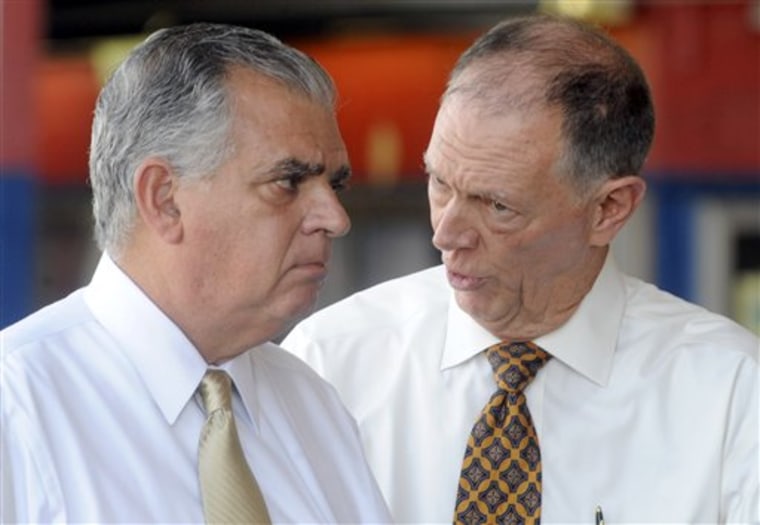Key senators have crafted a plan to end the partial shutdown of the Federal Aviation Administration that includes eliminating air service subsidies to some remote communities.
Sen. Jay Rockefeller, D-W.Va., chairman of the committee that oversees the FAA, hopes to bring a bill to end the shutdown to the Senate floor as early as Monday night, his staff said in an email to reporters.
The Senate bill will cut even more than the $16.5 million in subsidy cuts contained in a Republican-sponsored bill to extend the FAA's operating authority that was passed by the House last month, the email said. Senate Democrats refused to accept the cuts, and Senate Republicans refused to allow passage of an extension bill without them, setting up the shutdown.
"We can get this done," Rockefeller told reporters.
The subsidies program was created after airlines were deregulated in 1978 to ensure continued air service on less profitable routes to remote communities. The program has grown to provide service to about 150 communities, from Muscle Shoals, Ala., to Pelican, Alaska, and costs about $200 million a year. Critics say the subsides are too high and some of the communities are within a reasonable drive from a hub airport.
Rep. John Mica of Florida, chairman of the House Transportation and Infrastructure Committee, did not reply to a request for comment. Republicans in the Senate and the House haven't indicated whether they will accept Rockefeller's proposal, which capped a weekend of furious negotiations, going on at the same as the frenetic debt-ceiling negotiations.
"There is not going to be any progress until we quit spending money stupidly," Sen. Tom Coburn, R-Okla., told reporters earlier in the day. He said he would block any bill to end the shutdown that doesn't eliminate air service subsidies for communities that are within 90 miles of a hub airport.
Rockefeller has accused Republicans of using the subsidy cuts as leverage to try to force Democrats to cut a deal on a provision that would make it more difficult for airline workers to unionize. The labor provision is the primary issue holding up final passage of a long-term funding bill, but isn't included in the plan being considered Monday.
The FAA's long-term operating authority expired in 2007. Since then, Congress has been unable to agree on a long-term funding plan. The agency has continued to operate under a series of 20 short-term extensions.
The last extension expired at midnight on July 22, eliminating the FAA's ability to spend from a trust fund that pays for aviation programs. Airlines also lost their authority to collect the ticket taxes that provide the majority of the trust fund's revenue, costing the government an estimated $200 million a week.
The FAA has been forced to furlough nearly 4,000 employees and issue stop-work orders on more than 200 construction and other projects paid for with trust fund monies. Work on another $2.5 billion in airport construction grants has stopped because employees who handle the grants have been furloughed. Tens of thousands of private sector workers have been affected.
The agency has a budget of more than $16 billion this year and employs 47,000 people. Air traffic controllers have remained on the job. Administration officials have vowed that safety won't be compromised and travelers won't be inconvenienced.
But FAA Administrator Randy Babbitt revealed Monday that airport safety inspectors nationwide have been working without pay and shouldering travel expenses themselves since the shutdown began.
The 40 inspectors are in charge of regular checks covering runways, navigation aids and other systems at dozens of airports and airlines. A typical inspector may travel to five airports in a two-week period and rack up thousands of dollars in hotel and airline tickets, Babbitt said.
"We're asking for them to put the balance on their credit cards," he said. "It's not right to ask them to do that, it's just not."
Babbitt and Transportation Secretary Ray LaHood visited New York's La Guardia airport, where work has stopped on a $6 million project to demolish an old control tower. The old tower blocks the view from a new control tower built a few hundred feet away.
Furloughed engineering technician Gerard Cook, who worked on the new tower, said the shutdown took employees off guard and many families were not prepared to go without paychecks. With a new month beginning, many will be struggling to pay their rent and other bills, he said.
"People think all government employees just sit behind a desk and push a pencil," said Cook, 40. "They don't realize we're out here in the manholes and the mud and the heat and the bugs, working hard."
Also Monday, Delta Air Lines said it will refund the ticket taxes charged for travel during the shutdown, although it's not yet clear when travelers will see the money.
The refunds will apply to people who bought their ticket before the shutdown began, but who traveled during the shutdown. People who bought their ticket after the shutdown began didn't pay the taxes anyway — although they paid higher fares instead.
Associated Press writer Chris Hawley in New York and AP Airlines writer Joshua Freed in Minneapolis contributed to this report.
